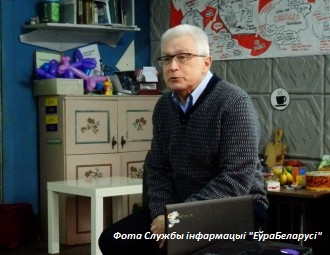EuroBelarus: During the Student Week Uladzimir Dunaeu, the member of the public Bologna committee, gave a public lecture and spoke about the long road of Belarus towards the Bologna Process.
«Universities were fighting for their freedom throughout their whole history"
Uladzimir Dunaeu started his speech at the youth center "Fialta" with offering the audience to think what a university is. After listening to various definitions, the lecturer suggested his own one: university is not an educational institution, but a corporation above all, a community of people bound by oath.
There are four European universities, which appeared in the XII - XIII centuries, exist up to these days and are considered the oldest ones: Bologna, Paris, Oxford and the University of Montpellier.
So, in the Middle Ages, universities were a part of the urban community alongside craftsmen guilds and others. This way the University of Bologna was created as a community of students on the basis of law schools. The community members were already mature people and they were hiring teachers. Also, it was only possible for a student of the university to become its rector. People who went through such universities adopted the knowledge of the democratic civil behavior.
- That is how universities were fighting for their freedom throughout their whole history, that is why so many of Europe's democratic institutions have a foundation of university culture, - said Uladzimir Dunaeu.
Bologna process. The beginning.
Uladzimir Dunaeu told that in the beginning in 1998, education ministers of France, Italy, Germany and the United Kingdom signed the Sorbonne Declaration. But then many European countries claimed that countries-“giants” impose their will on them. Therefore in a year representatives of 29 European countries signed the Bologna Declaration. They agreed on trying to modernize the system of higher European education in several directions, making a transparent and clear structure of educational processes, introducing the European Credit Transfer and Accumulation System (ECTS), i.e. creating an opportunity to use your diploma in one country after studying in another one, and to ensure the mobility of teachers and students. Belarusian students often face this problem after getting education abroad and being required to pass subjects they did not study there upon their arrival to Belarusian university (even if the courses have the same content but different names).
- In fact, Belarusians are no couch potatoes, - the lecturer continued the topic of mobility. - There is UNESCO statistics on how many Belarusians are studying abroad, and these are not exchange programs. So they are about 30 000 people. This is a very big number, since even the huge in comparison to Belarus Ukraine has only 50 000. But half of our citizens go to study in Russia.
"Students against"
Coming back to the Bologna process, Uladzimir Dunaeu told that currently it has 48 full member countries, and the last to join was Belarus.
- We had a chance to indicate our intention to join the Process at the Berlin Conference of the Ministers of Education in 2003. Belarus took part in it as an observer, and in 2005, together with Ukraine, could have joined the Bologna process.
But in 2004 in Belarus there was a sharp detour from internationalization of higher education to self-isolation. Prior to that they even managed to take some steps to approach the Bologna Process, for example, to amend the law "On education". But in 2001 the presidential elections took place and Alexander Lukashenka gained a "landslide victory".
- However, in those polling stations where it was possible to count the votes of students, it appeared they voted against.
Alyaksandr Kazulin was the rector of BSU at the time when only 5% of votes went to Lukashenka, and he lost his position after the announcement of such a result. There even appeared a term "oppositional universities", many of which will soon cease to exist.
- A state ideology emerges, as well as control over the education program, boosted development of the Belarusian Republican Youth Union and manipulation over choosing students - for example, a separation for students from the towns and villages, which existed until quite recently, and, lastly, the isolation from the "harmful influence of the West", - the speaker recalled.
The long road to Bologna
The Belarusian higher education system existed in isolation till 2009 until the question of joining the Bologna Process was raised again.
In 2011, Belarus applied to join the Bologna process and at the same time Public Bologna Committee was established on the basis of the National Platform of the Eastern Partnership Civil Society Forum.
- We have shown that Belarus is not only far from being ready to join the Bologna process, but also does not understand the extent of its ill-preparedness. In fact, it is not needed to comply with all the Bologna rules and criteria, one has to just demonstrate their willingness to follow this way, - said Uladzimir Dunaeu. - The European academic values, academic freedom and university autonomy, equality in access to higher education and democratic management system are the basis of it all. They kept their ears open to us and the EHEA Ministerial Conference in Bucharest decided that it is still too early for Belarus to join the Bologna process and it was asked to address certain problems by the next Conference.
In May 2015 in Yerevan Belarus was finally approved for the Bologna process, but conditionally. As a mechanism for a real and not imitational involvement in the Bologna process there has been developed a Roadmap for higher education reforms for our country, but Belarus is taking its time to implement it.



